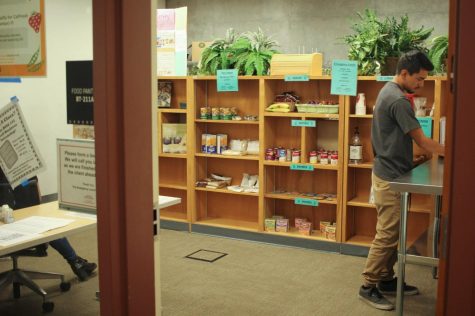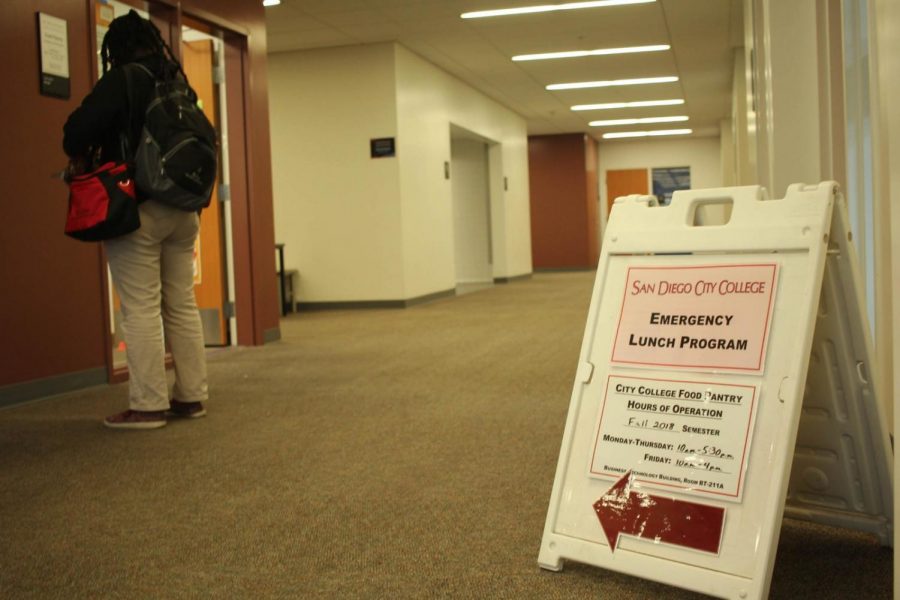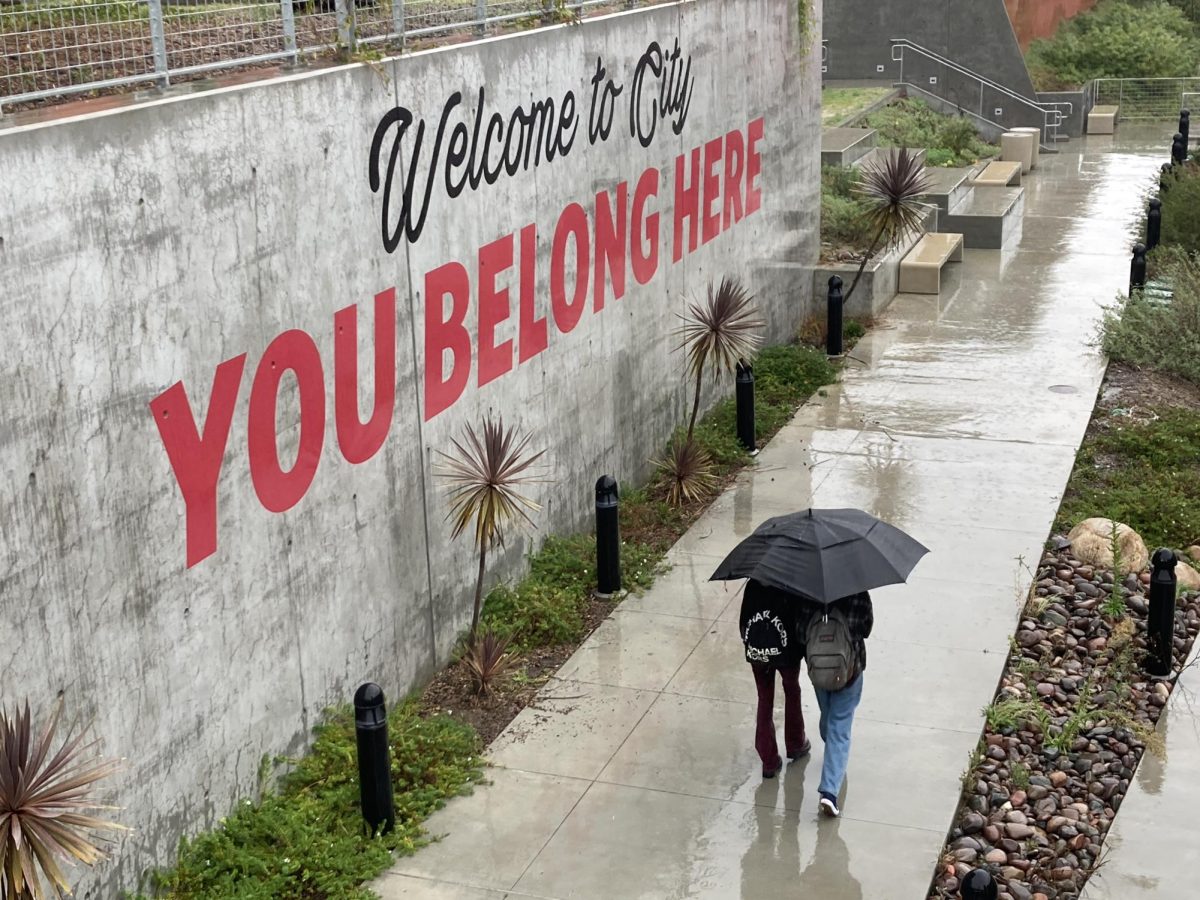City College helping homeless, hungry students (story & video)
City College is bolstering its resources to help growing number of students in need.
The San Diego City College Emergency Food Pantry supports enrolled students in need by providing non-perishable food and personal products. Photo by Nadia Mishkin.
September 11, 2018
Instant noodles, mac and cheese, canned tuna and vegetables, applesauce, snack bars.
Non-perishable food lines the shelves in City College’s Emergency Food Pantry on the second floor of the Business & Technology building, where enrolled students can get free food with a valid student I.D. card.
A pair of friendly student interns wait in the small room to attend to students who come for a pre-packaged lunch or food to take home. The interns check them in and guide them through their selections of entrees, snacks, and even personal products like soap and shampoo.

The City College Emergency Food Pantry is a project operated by student interns and supported by donations. Photo by Nadia Mishkin.
“We make students feel welcome and like they can count on us, which spreads confidence in them,” said Citlaly Vargas, one of the students working there. “We offer them their food and we can also offer them extra help if they ask for it, like informing them about other services like the showers at Harry West Gym.
“We tell students to come back, that it’s nothing to be ashamed of, to come back if you’re hungry. They really like it.”
Hunger and homelessness are a reality for a growing number of City College students, and the food pantry is one of several resources available on campus to support them.
Fifty-six percent of City College students faced food insecurity and 15 percent experienced some form of homelessness in the past year, according to a 2017 study by the University of Wisconsin’s Hope Lab.
City College is bolstering its resources to help students in need, and the food pantry’s supply will be doubled this semester thanks to a new partnership with the nonprofit organization Feeding San Diego that was announced Sept. 7.
The partnership will also provide a monthly on-campus farmers market so students can have access to fresh fruit and vegetables at no cost.
Other resources that City College offers to students in need include a clothing pantry, access to showers, mental health counseling and assistance with referrals for food vouchers, housing and shelters. However, navigating those resources isn’t always easy.
The San Diego Community College District website refers students facing homelessness to their campus Extended Opportunity Programs and Services office, which is located in the Academic Success Center at L-117. At the EOPS office, homeless students under the age of 25 can register for access to showers in Harry West Gym and get help obtaining priority registration for classes.
The district website says that the EOPS office can also provide “referrals to student support services including financial aid, CalWORKS, DSPS, food pantries, and mental health services” and “referrals to outside agencies that support homeless shelters, housing referrals, etc.”
These referrals consist of a folder of information with different flyers and pamphlets directing students to different offices across the campus and the city.
For students feeling overwhelmed or looking for guidance in maneuvering these resources, City College’s mental health counseling center offers support.
“(The mental health counseling center) is a great place to figure out all of the resources that are available in San Diego,” said Toni Martinez, an adjunct counselor at the counseling center. “Navigating all of the resources can feel really overwhelming, so sometimes it’s helpful to have a counselor to navigate the resources alongside you to make everything easier and ease that anxiety.
“We talk a lot with students about basic needs — food, housing and safety. We want to ensure that those needs are met first before we can even talk about mental health issues or family issues or whatever it is that people come to therapy to talk about. We want to make sure that those basic needs are met, so that they feel safe, and then we can move on to getting into the emotional or cognitive stuff.”
Mental Health counseling is located in BT-105, and students can visit the office to make an appointment or call (619) 388-3055.
While City College is helping students meet some of their basic needs, city officials continue to grapple with creating long-term solutions for San Diego’s homeless and housing crisis.
Mayor Kevin Faulconer announced that $50 million in new funding will be made available for affordable housing while visiting City College on Sept. 4. The money will be awarded to developers who will include affordable rental units in new projects or to preserve existing ones.
The City launched a “housing first” homelessness action plan in 2014. The plan focuses on getting homeless people off the streets and into an apartment, and then provides services like health and mental health care and job placement to keep them off the streets.
San Diego City College welcomes Mayor Kevin Faulconer and the San Diego Housing Commission to our Saville Theatre. Mayor Faulconer discussed getting more affordable permanent housing for San Diego. #sharecity #cityproud @kevin_Faulconer @SanDiegoMayorsOffice pic.twitter.com/biseCuSejW
— SanDiegoCityCollege (@sdcitycollege) September 4, 2018
“Solutions to our housing crisis are solutions to our homeless crisis,” Mayor Faulconer said during his press conference on campus. “Today we have an opportunity to make a difference on both.”
Promises for affordable housing in coming years might not be very comforting for students who don’t know where they are going to sleep each night or get their next meal, but the resources at City College can help them get food and shelter on a day-to-day basis.










